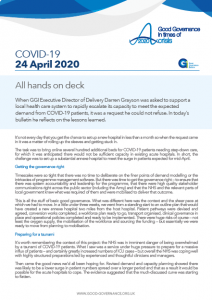All hands on deck
24 April 2020

When GGI Executive Director of Delivery Darren Grayson was asked to support a local health care system to rapidly escalate its capacity to meet the expected demand from COVID-19 patients, it was a request he could not refuse. In today’s bulletin he reflects on the lessons learned.
It's not every day that you get the chance to set up a new hospital in less than a month so when the request came in it was a matter of rolling up the sleeves and getting stuck in.
The task was to bring online several hundred additional beds for COVID-19 patients needing step-down care, for which it was anticipated there would not be sufficient capacity in existing acute hospitals. In short, the challenge was to set up a substantial annexe hospital to meet the surge in patients expected for mid-April.
Getting the governance right
Timescales were so tight that there was no time to deliberate on the finer points of demand modelling or the intricacies of programme management software. But there was time to get the governance right – to ensure that there was system accountability and leadership for the programme, that there were high quality stakeholder communications right across the public sector (including the Army) and that the NHS and the relevant parts of local government knew what was required of them and were mobilised to deliver that outcome.
This is all the stuff of basic good governance. What was different here was the context and the sheer pace at which we had to move. In a little under three weeks, we went from a standing start to an outline plan that would have created a new annexe hospital two miles from the host hospital. Patient pathways were devised and agreed, conversion works completed, a workforce plan ready to go, transport organised, clinical governance in place and operational policies completed and ready to be implemented. There were huge risks of course – not least the oxygen supply, the mobilisation of the workforce and sourcing the funding – but essentially we were ready to move from planning to mobilisation.
Preparing for a tsunami
It’s worth remembering the context of this project: the NHS was in imminent danger of being overwhelmed by a tsunami of COVID-19 patients. What I saw was a service under huge pressure to prepare for a massive influx of patients – and certainly greatly increased numbers of ICU cases – but overall the NHS was coping well with highly structured preparations led by experienced and thoughtful clinicians and managers.
Then came the good news we’d all been hoping for. Revised demand and capacity planning showed there was likely to be a lower surge in patient numbers spread over a longer period and that as a result it would be possible for the acute hospitals to cope. The evidence suggested that the much-discussed curve was starting to flatten.
The annexe hospital programme was duly stood down and we all breathed a sigh of relief. On a personal note, of course it would have been an exciting challenge to see the programme through to completion, but there is no doubt at all that it is a very good thing for patients and the NHS that it wasn’t needed.
Lessons learned
With the benefit of a couple of days of reflection, what are the lessons to share from this extraordinary experience?
At times of crisis when action has to be taken quickly the principles and disciplines of good governance are more not less important. If they are neglected, work is harder to deliver and undoubtedly takes longer.
There are a four key factors that strike me as particularly important.
- First, be crystal-clear about your objectives; write them down and make sure everyone involved understands and agrees them. Never underestimate the power of repetition. Without clarity of objective, uncertainty and confusion is sure to follow.
- Second, work with stakeholders to develop a plan for delivery, being clear about resources required and timescale, guard against optimism bias.
- Third, identify risks and mitigations and build the discipline of risk management in from the very start.
- Finally, you can never communicate too much and you should seek to communicate in ways that will be heard – so shape your messages to the needs of the intended audiences, check you have been understood and then check again.
We are living through an extraordinary time – unique, perhaps, certainly in the modern era. There is much talk of the new normal and transformation by necessity. Time will tell if we really do embrace a new normal or we revert to previous well-established and familiar ways.
What is clear is that the principles of good governance are as valuable at a time of a national crisis as they always are.
If you have any questions or comments prompted by this bulletin – please call us on 07732 681120 or email advice@good-governance.org.uk. We will aim to respond within 24 hours.

